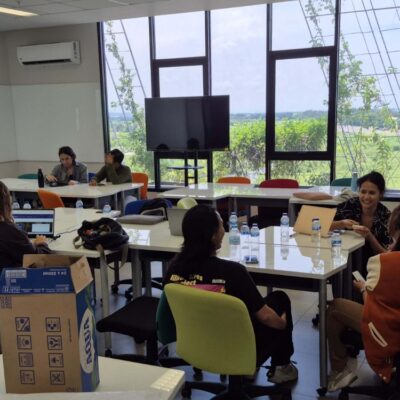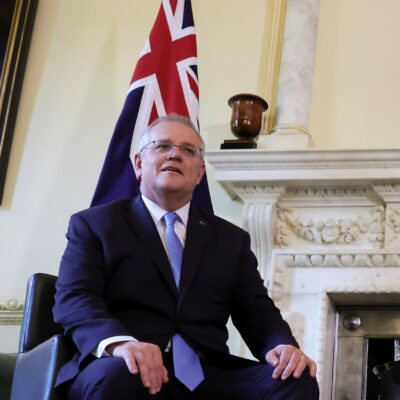Research into the securitisation of Australian Muslims and Islam after the September 11, 2001 attacks on the USA has revealed its negative effects on individuals’ sense of belonging and social interactions with non-Muslims. However, what remains less well understood is its impact on intra-community relationships between Muslim men and women.
I conducted 25 interviews with Muslim women leaders between May 2022 and April 2023 which provide female perspectives on this subject. Participants included the executives of community organisations, in addition to well respected informal authorities.
The stigmatisation of young Muslim men that occurred against the backdrop of anti-terrorism measures introduced in Australia following the 9/11 attacks continues to impact contemporary expressions of Muslim masculinity. There are growing concerns about an emergent anti-women backlash in Australian Muslim communities as young men look to alternate ideologies to explain their perceived disempowerment. Although this development cannot be divorced from the broader anti-women and anti-feminist movements currently observed across many western societies, its manifestation in some Muslim communities is interlinked with Australia’s securitisation of Muslims, revealing the convergence of these different social issues.
Australia’s securitisation of young Muslim men
The securitisation of Australian Muslims and Islam in the twenty-first century has perpetuated the image of young Muslim men as terrorists, street thugs and misogynists. These portrayals drew on pre-existing prejudices about Islam and gender that were inflamed by domestic and international terrorist attacks and the subsequent increased surveillance and policing of Australian Muslim communities.
This is not a by-gone legacy of the ‘war on terror’: there continues to be the casual association of young Muslim men with criminality and violence. For example, in 2021, separate studies of Australian high school students conducted by scholars Abe W. Ata and Randa Abdel-Fattah revealed that when non-Muslims were asked what were the first words that come to mind when ‘Muslim’ was mentioned, words such as ‘terrorist’ and ‘violent’ frequently appeared. In a similar vein, youth leader Huda*, when speaking of the representation of young Muslim men from her Western Sydney neighbourhood in popular media, said that they are often depicted as ‘drug dealers and killers, they go to prison, they date white women because they’re ‘easier’.’ Huda* noted that some in the area fit these stereotypes, stating, ‘I go down to Bankstown [a suburb of Sydney] and those boys do exist. I’m not going to lie and say that attitude, that rebellion doesn’t exist’; however, these depictions remain by and large an offensive caricature of the young Muslim men in her community.
Stigma surrounding Muslim men has had significant consequences for their inclusion in public discourse. During interviews, several women stated that the increased visibility of the perspectives of Muslim women in the years following 9/11 coincided with a public sidelining of Muslim men. As they understood it, the increased focus on Muslim women was largely due to prevailing narratives in western societies that they were oppressed and in need of saving from both their faith and from Muslim men. Therefore, the increased involvement of Muslim women in community representation and decision-making processes aligned with governments’ (problematic) objectives to ‘empower’ Muslim women. Furthermore, it reflected an unwillingness on behalf of the Australian public to hear the voices and views of Muslim men.
Noor*, an academic and founder of a Muslim community organisation, reflected on the continued lack of representation of Muslim men in Australian media and public life. For example, whilst political television programs such as Q+A often have articulate and highly-educated Muslim women on their panels, several participants, including Noor*, expressed the view that Muslim men are included less frequently. She said, ‘Having a coherent, very impressive Muslim man is not something they [the Australian public] can handle. Well, they can handle one [at a time].’ Anything more would be considered too threatening.
The desire of some Australian institutions and the media to see Muslim communities represented by women potentially feeds into a gendered competition between Muslim men and women. Iqra*, a policy advisor, said that it has been a significant cause of tension within her Muslim community at different points in time; some male leaders have expressed resentment towards women who are more frequently approached by the media to speak on behalf of the community. While there are examples of high achieving Muslim men in Australia’s public life and media, Noor* said that Muslim men, widely, ‘are being left out of the conversation…but they have things to say, I’m sure.’
Generational trauma
As the generation of young Muslims raised during the ‘war on terror’ come of age, there is increasing recognition and discussion of the trauma they experienced growing up in a climate of surveillance and suspicion.
It has impacted young men in myriad ways, from their self-worth and understanding of their faith, down ‘to the smallest details’ relating to their appearance, said Fatima*, the head of an Islamic organisation. Do they grow a beard? Do they anglicise their names and forgo traditional clothing? Men are making these decisions in an environment ‘riddled with Islamophobia and [where] everything we [men] do and say publicly is automatically looked at through this lens of ‘these-barbarian-Muslims-who-behead-people-over-in-the-Middle-East’.’
As two interviewees saw it, the trauma of being cast as a suspect in Australian society is further intensified by young men’s often privileged positions within their own communities. Although generalising across different local contexts and cultures, they posited that young Muslim men grow up ‘pampered’ (Iqra*) and ‘culturally enabled to remain mummy’s boys or coddled by their fathers’ (Amina*). This is not to diminish the deeply challenging experiences of many young Muslim men in Australia, but to highlight the stark discrepancy between the social positions of some of them within their own communities and in broader society.
Iqra* explained:
‘Being a boy in our communities is a luxurious space to be in when you’re young. You’re looked after, you can do what you want, like engage in sport or travel. You are given privileges that not all girls are given…You grow up with this privilege in your family, in your community, and then when you go out into the real world all that is stripped from you. You are seen as a lesser person. You are seen as a terrorist.’
This is a traumatising experience for many young men who feel humiliated, emasculated and stripped of dignity.
Complicating understandings of the generational trauma experienced by young Muslim men in Australia is Ghassan Hage’s assertion that second-generation Muslims experience ‘a more intense sense of injury from racism’ than their parents. This is because they experience racism and Islamophobia from an earlier age which is, crucially, directed at them with their own culture and language. As ‘insiders’ to Australian culture and vernacular, they are hyper-aware of the subtleties and nuances of everyday exclusion. Unlike first-generation Muslim migrants who may expect and tolerate a certain level of racism and Islamophobia, Hage posits that second-generation Muslims, as Australian-born citizens, feel an idealised entitlement to non-discriminatory treatment ‘that even non-racialised citizens have no access to.’ This combination of hyper-sensitivity and idealised entitlement ‘can swell up into a sometimes formidable state of resentment that is very different in intensity from the sentiment felt by first-generation immigrants when faced with racism’ as second-generation Muslims initially believe that there is a place for them in the Australian society into which they are born, only to feel cruelly deceived when they experience rejection.
This intergenerational dynamic was observed among young first- and second-generation African Muslims in a study of Melbourne’s high-rise public housing in 2020, commissioned by the Scanlon Foundation Research Institute. One man said, ‘Because we came here as refugees at the age of ten, we knew we were outsiders and we were OK with it.’ Conversely, he stated that many young Muslim boys born in Australia were disillusioned with their position in society following experiences of racism. Boys as young as twelve were saying that there was no point trying at school because university was ‘a waste of time’ and they would never be hired in a white collar profession because of their ethnicity and religion. These experiences of exclusion become self-reinforcing as young men start to withdraw from broader society.
Young Muslim men may look to alternative ideologies when disillusioned by the betrayal of mainstream multicultural rhetoric of inclusion and equality. This includes anti-women ideologies that espouse that young men’s perceived disempowerment can be overcome by reasserting gendered dominance. Consequently, Muslim women and their subversion of ‘natural’ male authority are blamed for men’s ongoing challenges in Australian society, rather than the extended generational impacts of securitisation.
Impacts on relationships with Muslim women
A key finding of my interviews with Australian Muslim women leaders was that several held serious concerns that young Muslim men’s traumatic experiences of securitisation were manifesting within some communities as an emergent anti-women backlash. They suggested that feelings of humiliation and powerlessness were propelling some to reassert their ‘masculinity’ by exercising power over women.
There is a prevailing sentiment amongst many of the women interviewed that, while young women are stepping up to address community issues caused by Australia’s securitisation of Muslims, young men are stepping back and disengaging. This was seen as a particular issue amongst younger generations, many of whom Amina* fears are becoming absorbed in the so-called ‘manosphere’ and its anti-women ideologies.
The ‘manosphere’ refers ‘to the wider phenomenon of growing communities of men online who are focused on a range of concerns, but often centred on the defence of traditional masculinity.’ Within these communities, predominantly led by young men, feminism and women’s changing roles in society are seen as a threat to men and their ‘right to be men’.
Amina*, the co-founder of a Muslim women’s organisation, stated:
‘There is a vibe amongst young women that our men are not stepping up in any capacity, whether it’s educating themselves, whether it’s pushing themselves to attend courses and workshops that open their horizons, whether it’s supporting us and protecting us from Islamophobia. There is a huge perception that as Muslim women find their voice and agency, Muslim men are unfortunately going in the opposite direction and being influenced, for example, by a name that you may have heard of a lot, which is Andrew Tate.’
Tate rose to online infamy in 2022 due to controversial videos on social media that espoused a mix of misogynistic vitriol and self-help style advice for young men seeking to transform themselves into ‘alpha-males’. According to Amina*, Tate has been promoted to young Muslim men by some male religious- and community leaders, with mosques and Islamic community centre Facebook pages sharing videos and memes of him with their audiences.
This broader anti-women development in Western societies is a pressing concern for Fatima*. As she described, over the last several decades, ‘we’ve gone from knowing women’s rights to feminism, we’ve gone from feminism to the emasculation of men, and now we’re going anti-woman. We’re going back to where we were but with a vengeance. That is petrifying.’
The generational trauma of securitisation was understood to be a key factor in the appeal of these views amongst some young men. Amina* said, ‘They want assertive role models. They want role models that recognise their generational trauma and their cultural issues and speak to them.’ At times, these were found in the tough-talking figures of the anti-women/anti-feminist movement who not only spoke to men’s feelings of emasculation but also offered a path to reclaiming their power, often through the defence of traditional gender roles.
These concerns have not only been expressed by Muslim women. In a 2022 podcast produced by the community organisation Muslim Women Australia, Graith Krayem, the former president of the Islamic Council of Victoria, a peak Muslim body in Australia, spoke to this gendered dynamic he was observing. He argued that the securitisation of Muslims has had a significant impact on the psychology of men and expression of masculinity within Australian Muslim communities. When confronted with continual challenges to their religion and identity as young Muslim men, these individuals have had to be ‘strong’ in their commitment to their faith. However, he argues, many have adopted the mindset that they need to therefore display strength in all aspects of their lives—including in their relationships with women. Issues of patriarchal cultural practices within communities have resulted in ideas of ‘strength’ and ‘being a man’ commonly associated with control and power. This is negatively impacting men’s relationships with women as the idea is perpetuated amongst some that, in order to be a man, a woman needs to be ‘bowing to your every wish and command’.
Intersecting social issues
We must not overlook the fact that, as citizens of a Western society, young Muslim men are influenced by, and involved in, broader societal movements. This includes the view that ‘masculinity’ and men’s traditional position in society is under attack. There are some vocal sections of society who believe that men in the West have been disempowered, with modern women and liberal gender norms accused of undermining men’s traditional roles as protectors and providers.
Although a class of ‘Muslim elites’ has emerged in Australia, often constituted by ‘overseas born, highly educated’ individuals, there are persistent and entrenched issues of economic disadvantage within some communities, particularly those born in Australia. This local-born segment reports much lower levels of educational attainment than overseas-born Muslims and the general Australian population. Upward social mobility is further hindered by Muslims disproportionately working in ‘jobs characterised by precarious working conditions and low wages’. When considering the generational impacts of this socio-economic disadvantage upon young Muslim men who came of age during the ‘war on terror’, political sociologist Joshua M. Roose and colleagues argue that such material marginalisation is feeding into feelings of being ‘left behind’ and ‘excluded’, creating ‘a sense of collective injustice, anger, and disempowerment’.
Concerns have also been raised by some in Muslim communities given that, scripturally, women are under no obligation to provide financially, with this responsibility placed on men. Consequently, a young man’s education and economic status in Australia can have significant implications for his perceived value during matchmaking and courtship.
A major social issue Amina* is currently seeing play out across Muslim communities in Australia is that ‘a lot of Muslim women are choosing to be single’. She argues that a significant number of young men are being passed up because ‘we [women] see them as complacent in their education. They’re not pushing themselves…A lot of men sadly will not show up to workshops that they need to attend.’ This includes community-run workshops about masculinity, mental health and Islamophobia.
Fiza*, the CEO of a Muslim women’s organisation, argues that some young men’s unwillingness to engage with community programs stems from the ‘war on terror’, whereby grassroots initiatives for this cohort were frequently underpinned by governments’ security agendas. She said, ‘You can’t just wake up from post-9/11 era of demonising and dehumanising our men and expect them to then turn around and want to engage with those very same services that were criminalising our existence.’ Although government agencies appear to be in the process of moving away from Muslim men being the sole focus of domestic security concerns, paying increased attention to the threat posed by far-right extremism, there is potentially a lingering reluctance amongst some young Muslim men to engage with authorities. Within some communities, this is to the detriment of men’s matchmaking prospects, which potentially contributes to existing feelings of exclusion and increases the appeal of alternate ideologies, such as those of the online anti-women movements.
Future directions
The securitisation of Australian Muslims and Islam has had profound and lasting impacts on these communities, which have become the subject of a growing body of research. Its effects on young Muslim men are observed in some of the challenges in the relationships between men and women. Insights from interviews with Australian Muslim women in positions of grassroots leadership reveal a new avenue for future research that is both novel and pressing in its contemporary relevance: the connection between securitisation and the involvement of some young Muslim men in the growing anti-women/anti-feminist movements observed across the West. Preliminary findings suggest that this interplay may be crucial to understanding the appeal of the latter amongst this demographic.
*Pseudonyms for interviewees are used throughout
Image: Lakemba Mosque in Sydney. Credit: Dnalyensid/Wikipedia




